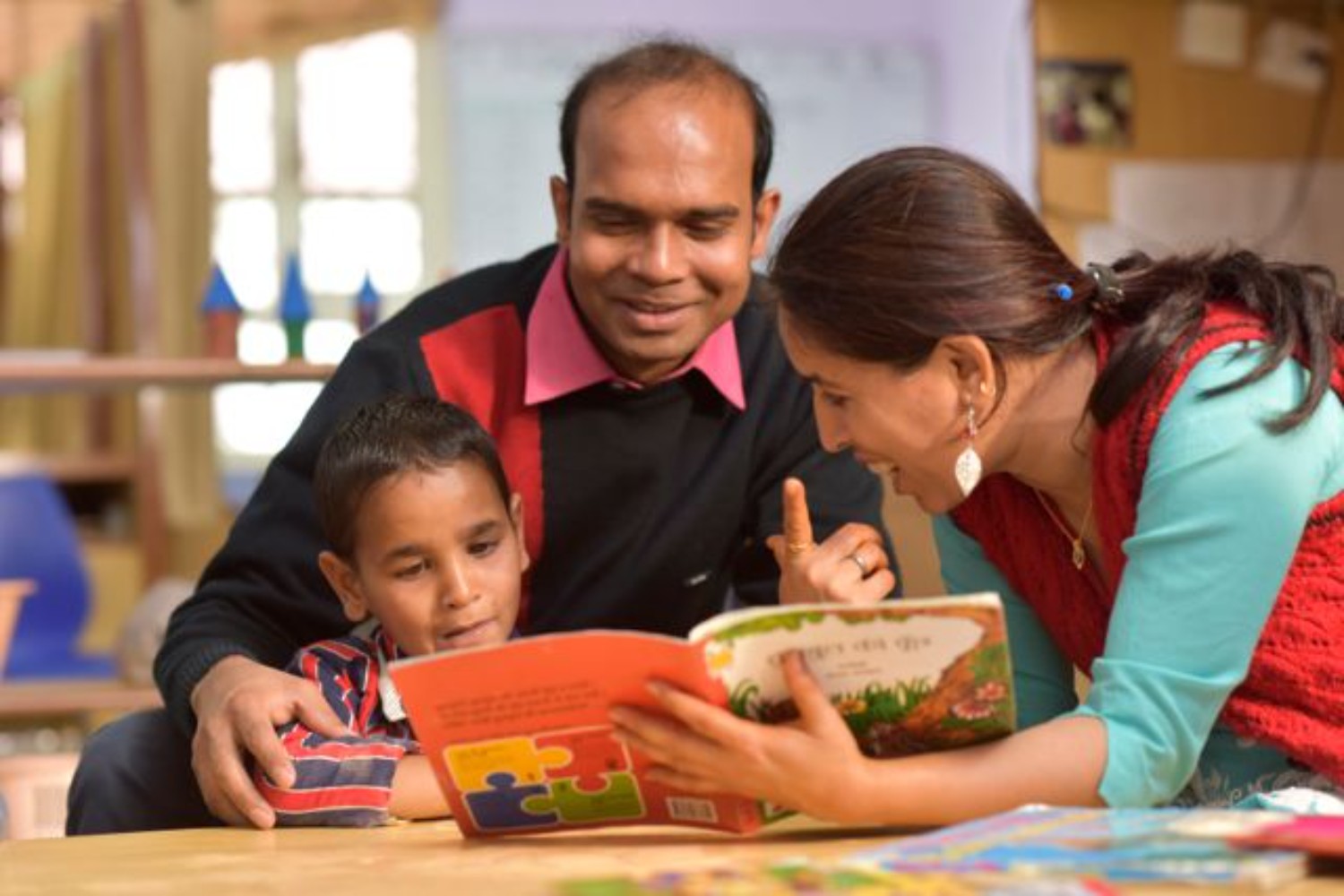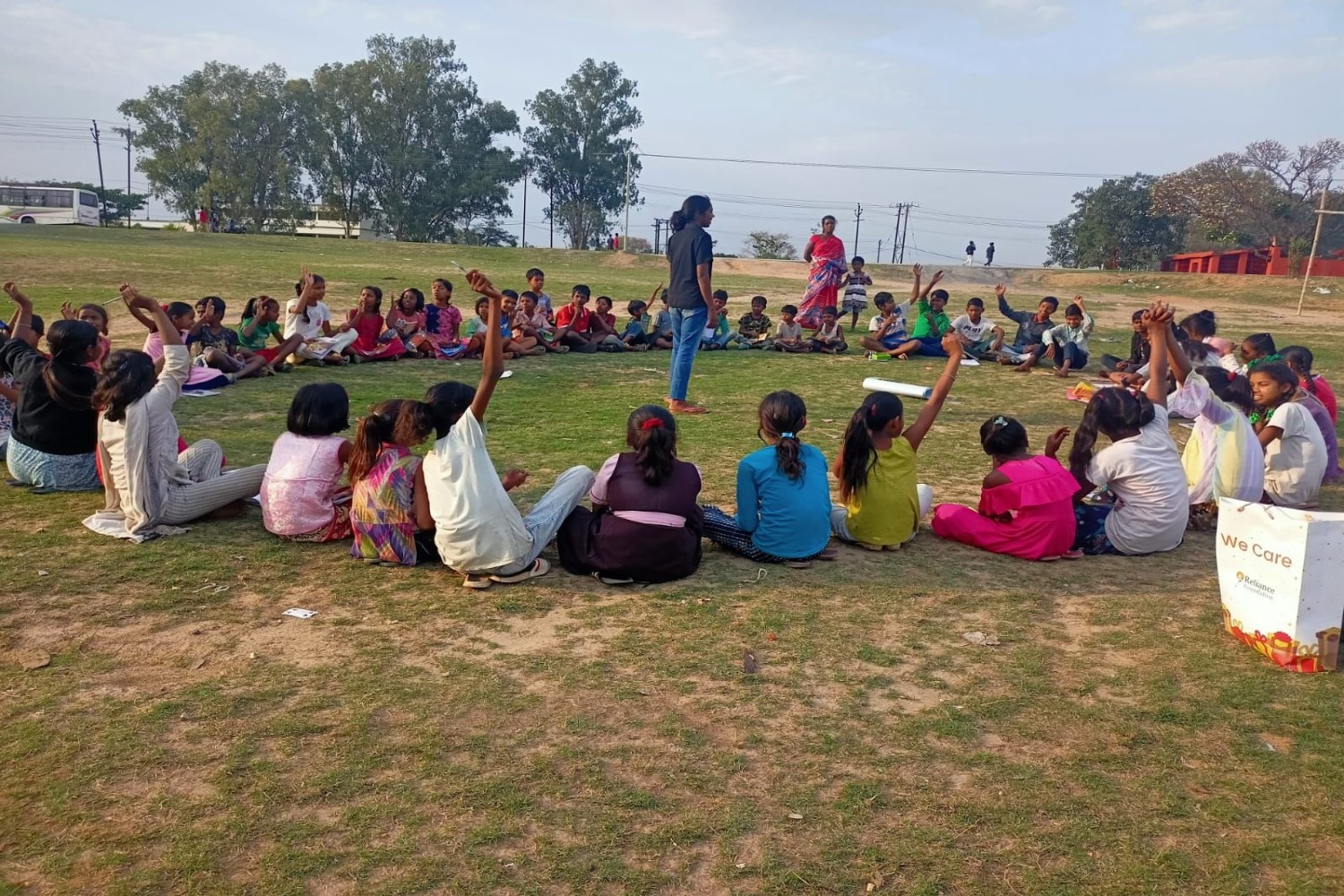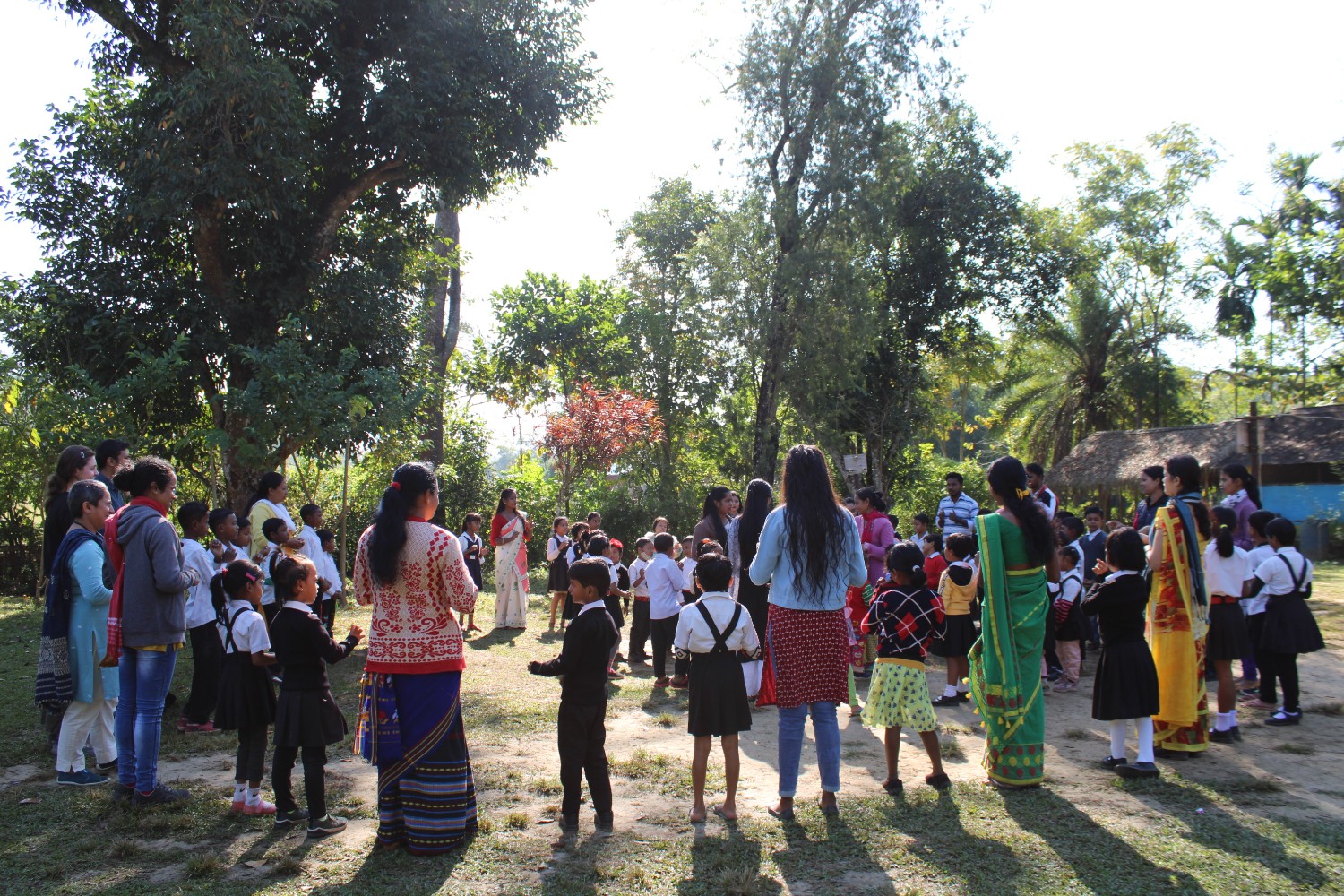Latika Vihar: more like real life
Jo Chopra McGowan shares the experience as a member of the team that sustains Latika Vihar as an inclusive learning space open to all children, by making play the center of the facilitation.

“To be yourself in a world that is constantly trying to make you something else is the greatest accomplishment.“
~ Ralph Waldo Emerson
Play is essential for children’s development. Far from being a waste of time, or something children should only do after their homework is finished, play is actually how children learn. We scold them for ‘playing’ with their food or daydreaming when they should be studying, or splashing and wasting water when they should be taking a bath, but it is precisely at these times that children’s brains are making connections and making sense of experiences. Without play, children’s lives are diminished and their development is impaired. The joy we associate with childhood is seen most vividly in the way children play.
Even in the most difficult circumstances – dire poverty, war, natural disasters – children find ways to play. In news reports of the recent earthquakes in Turkey and Syria, it was amazing to see footage of children playing amidst the wreckage. A puddle of water, a pile of broken bricks, a stub of chalk – all were transformed into toys by a child’s imagination and desire to have fun. While their parents understandably grieved for the loss of life and property, the children were already engaged in healing through the incredible power of play.
Unfortunately, here in India, many adults no longer understand this. For them, the purpose of childhood is simply to prepare for becoming an adult, and being an adult is serious business.

We all know about the insane and counterproductive demands placed on children as young as 2 and 3 to get into the best preschools, so that ultimately they can get into the best colleges and bag the best jobs. And yet, consistently, children foil our efforts by their stubborn desire to play.
They aren’t being naughty or difficult. They literally can’t help it. Children are hard-wired to play. It’s how they learn. If we try and stop them, all we achieve is to make them less intelligent and less happy.
Limits on their play is a serious problem for all children. However, for some it can be catastrophic. According to the WHO, more than one billion people in the world live with some form of disability. Some 200 million of them are here in India. Children with disabilities are statistically more likely to be out of school and to have fewer friends. As a result, disabled children have extremely limited opportunities to play.
According to a UNESCO report, in developing countries like India, as many as 75% of disabled children are out of school and largely stuck at home. Stigma, mobility difficulties and lack of access make getting out and about near impossible for many children.
Here in Dehradun, many families tell us their children are refused admission to school, ostensibly because there are no special educators, and teachers feel ill-equipped to teach disabled kids.
Yet the fact that these children are also made to feel unwelcome on playgrounds points to something deeper and more troubling. Parents of typical children say they fear disabled children may be contagious and they are judgmental about their behavioral differences, while their children often tease and bully them.
At Latika Vihar (LV), our inclusive children’s club in Dehradun, it’s a whole different story. Admission at LV is open to all, regardless of income, ability, religion or caste. When we say everyone, we mean everyone. There are only three rules. Be Kind. Play Fair. Everyone’s Included.
But we don’t expect children to know how to follow those rules on their own. We make it easy for them by setting things up, so that everyone has a chance, and so the decks are stacked in everyone’s favour. Our activities and games are designed so that every child can take part and have fun.
Some kids need help to run; some need help remembering where the finish line is. Some need to be reminded to be gentle and that everyone takes turns here while others need to be pushed a bit to try new things and to stand up for themselves.
The funny thing about Latika Vihar is that we weren’t thinking about inclusion when we set it up. We were just thinking about how to ensure that children had fun and that no one got left out or bullied or made fun of. Word spread and soon we found more and more disabled children joining.
As one mother put it, “The stress and tension of the day fall away the moment I enter this gate. I feel like I belong here. The entire team– not just one person or two – everyone, from the caretaker to the manager, is so caring and friendly. Whenever I see a disabled kid anywhere, I want to walk up to them and tell them to come straight to LRF. The kind of services we have here aren’t available anywhere else in the state.”
We even have psychologists and counsellors ‘prescribing’ admission to Latika Vihar for children in their practices. Shy kids, anxious kids, bullies and aggressive kids are sent to us and somehow, they all thrive here.
I was standing near the office at Latika Vihar a few days ago when a young couple walked through the gate with their little boy. Even from a distance, I could see that he had some issues. The parents looked nervous and worried. I greeted them warmly and they told me they wanted to enrol their son.
I invited them in to the office for the formalities and, as they turned to go there, I suggested that they leave the little boy with us. “He can play while you fill out the form,” I said.
They looked alarmed. “He’ll stay with us,” the Mom said.
But while the parents sat diligently in the office, discussing the centre’s hours and programs, Little Boy was desperate to join the fun. The tighter his mother held him, the harder he tried to escape. Finally, I went to her again and gently suggested that she let him play with the other kids.
“Oh, no,” she said sadly. “He’ll just hit them.”
“Don’t worry.” I reassured her. “We know what to do.”
Finally she gave in and set him free.
Instantly, he raced over to the first child he saw and bonked her on the head, just as Mom had predicted. But before Mom could swoop in for the save, Hema was already there. (How did she see trouble brewing? I have no idea. Sixth sense.)
No big deal. That’s what we do.
Hema diverted Little Boy and he was immediately on to the next challenge. He darted from one child to the next, intent on a ‘whack and steal’ approach. He wanted whatever toy anyone else was playing with and he wasn’t shy about seizing it. His parents could hardly attend to the form they were filling out, so anxious were they about what he might be doing.
But as Hema anticipated his every move, shielding the other children while following Little Boy’s lead, they seemed to relax a little. Finally he spotted a swing on the other side of the playground and made a beeline to it. Along the way, he had to run across the badminton field whose net was just low enough that he had to duck his head to go under it.
Hema settled him in the swing with another child and left him there in the care of the sports teacher. Then she came running back across the yard calling out to other staff: “Did you see him? SO CUTE! And did you see how he ducked his head going under the net? SO SMART!”
The parents were flabbergasted and confused: Their little boy? Could she possibly be talking about HIM?
Would it matter if we told them that Hema – and all our staff – feel that way about each and every child? That we love them to bits? That we see each one of them walk through the gate with a rush of emotion and pride; of curiosity and anticipation: Just what are they going to do next?
And when, inevitably, one of them does something unacceptable (because they all do, every day, just like us) we accept it as a little diversion on the road. We gently steer the child back to where she meant to be and we ignore the slip-up. Because, and this is the magic of Latika Vihar in a nutshell: WHAT YOU PAY ATTENTION TO, YOU GET MORE OF.
Write it down, parents. It’s true.
Do you want a whiny, irritating kid? Give him lots of attention when he misbehaves and ignore him when he’s good. Or perhaps you’d rather have a cheerful, helpful child? Then follow Hema’s lead. Notice your child when she’s doing something good. Catch him doing something right.
We are so quick to pounce on all our kids’ mistakes. We love to correct them, to point out their failings, and scold and lecture them when they stray. This is strange. I mean: Don’t we hate it when people do that to us? Does it ever work? No. It doesn’t.
The magic of Latika Vihar is acceptance. We simply take kids as they are and expect them to be even more amazing. They seldom disappoint.
Our aim is to hone and nurture children’s talents, and find meaningful venues to showcase these. Our emphasis is always on fun, participation and creativity. Team building, problem-solving, social and communication skills help all of us. Remembering that participation is more important than winning makes our philosophy of non-competitive fun stressfree and exciting.
Our activities are many and varied and include crafts like pottery, painting, bamboo pottery, kite making, drawing, sketching and coloring and skills like Taekwondo, dance, music, cooking and sports. We have a well-stocked library, outdoor equipment, computers, nature walks, science experiments and frequent theatre projects. We also take children to nearby museums, restaurants and botanical gardens.
But for many of the younger children, especially on first joining, the hands-down favorite is the sandpit. And for the older ones, the chance to sit with their friends for long heart-to-heart discussions is why they keep coming. The secret to all these offerings, though, is that there is literally no pressure ever. Children are free to sample activities and leave them if they prove boring or too difficult. We never insist beyond the first gentle invitation. We genuinely believe that kids know what they like. We also believe it’s their right to choose what they do for fun.
We need more Latika Vihars, places which don’t try to force anything on children and which allow them to simply be themselves. Most children’s centres are focused on teaching and achievement. Competition is inevitable and the same kids who shine in school, shine at these so-called play centres as well. They get to star in the plays, get selected for the front line in all the dances and have their art work displayed. They’re tidier than Latika Vihar and their Parents Day functions are definitely better organized. But disabled kids can’t get admission and bullies are sent right home.
Latika Vihar is more like real life. It’s a bit chaotic and there’s plenty of trial and error. But there is an attitude of acceptance and respect underpinning everything we do and the humility to accept our weaknesses and work to correct them. We believe we’re modelling for children what inclusion really looks like while giving them the experience and the skills to make it happen in the rest of their lives.




No approved comments yet. Be the first to comment!